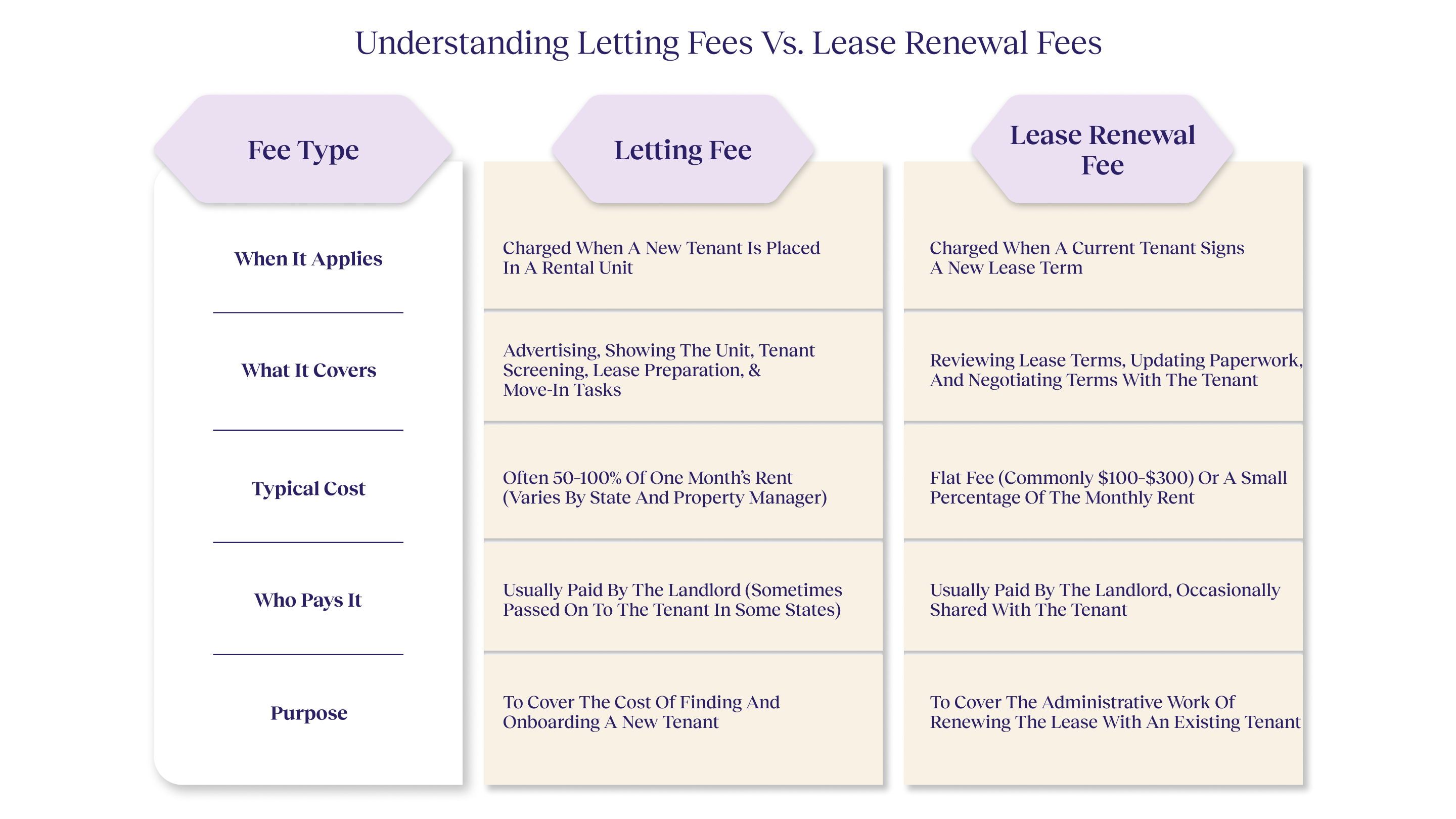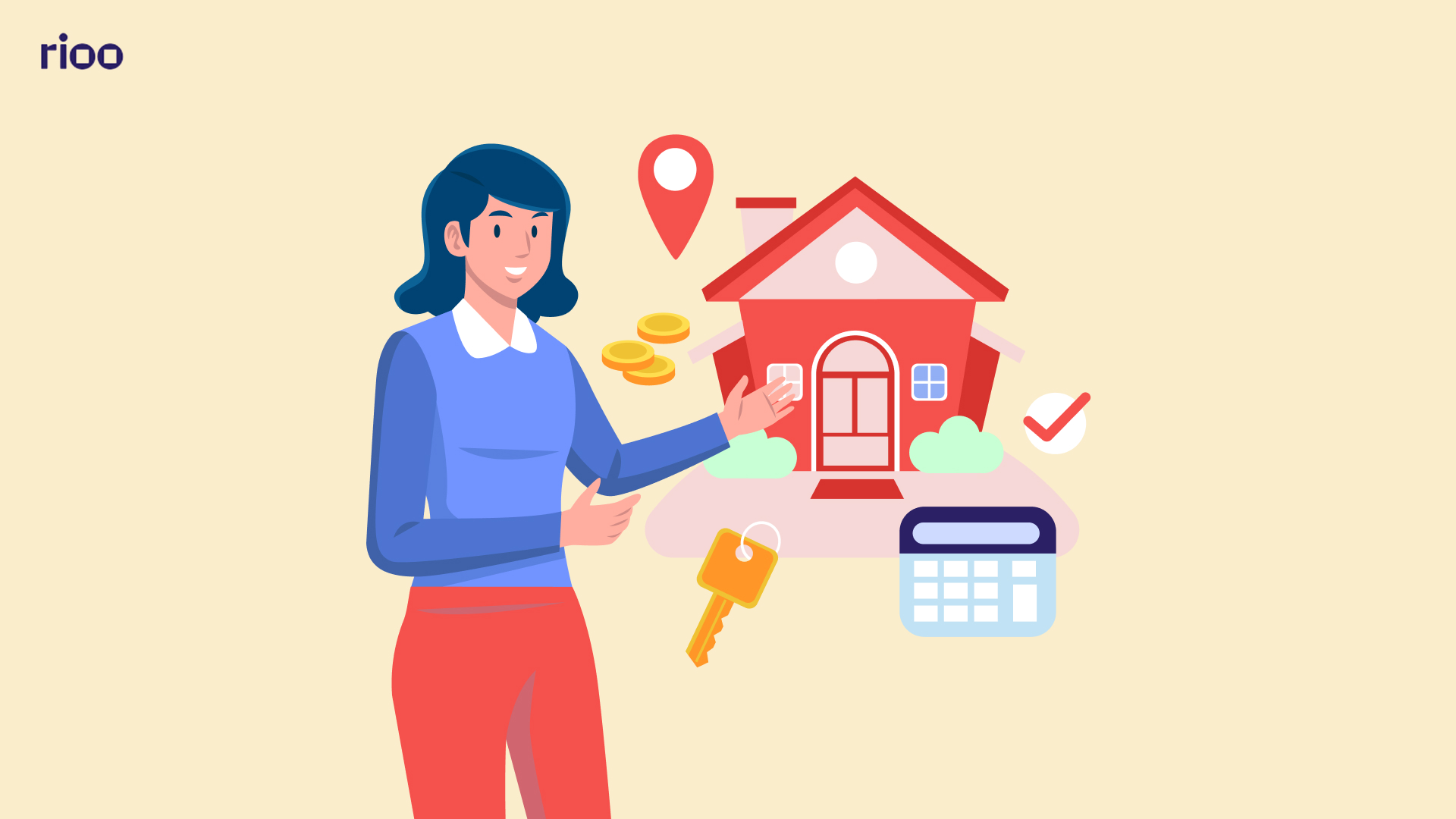You might see a lease renewal fee on your invoice and wonder what it pays for. As a property manager, you know this involves covering updated lease documents, a review of terms, and coordination with tenants.
According to a survey, 83.4% of property management companies charge a flat lease renewal fee, and the average amount is $231.77 per renewal.
Knowing exactly what’s behind that charge helps you talk about it clearly and fairly, whether you’re paying it or collecting it.
This article walks you through what a lease renewal fee usually includes, typical pricing structures, and how you can present it transparently to tenants.
TL;DR
-
A lease renewal fee covers the administrative work involved in extending a lease, such as updating documents and coordinating with tenants.
-
Landlords often charge a flat fee or a percentage of monthly rent as the renewal fee.
-
Renewal fees help cover costs without increasing monthly rent directly.
-
Clear communication about renewal fees improves tenant trust and satisfaction.
-
Using tools like RIOO can simplify managing lease renewals and property operations.
What Is a Lease Renewal Fee?
A lease renewal fee is a charge applied when you extend your rental agreement beyond its original term.
For tenants, it usually shows up as an additional cost during the lease renewal process.
For property managers, this fee helps cover the administrative tasks involved in updating and finalizing the new lease.
Renewing a lease involves more than just signing a document. It includes several important steps, such as:
-
Reviewing current market rents to ensure the new lease reflects fair pricing
-
Updating lease clauses to comply with any changes in laws or policies
-
Verifying tenant information and eligibility for renewal
-
Coordinating communication between tenants and property management
-
Preparing and processing updated lease documents
These tasks take time and resources, which the lease renewal fee helps cover. Knowing what this fee includes can make the renewal process clearer and smoother, whether you’re paying it or charging it.
Also Read: How Digital Leasing Tools Are Quietly Saving Property Managers Hours Each Week
It’s important to know how lease renewal fees differ from letting fees to avoid confusion during your property management process.
Understanding Letting Fees vs. Lease Renewal Fees
When managing rental properties, it’s important to know the difference between letting fees and lease renewal fees.
Both involve administrative work by property managers but apply at different stages of the tenancy. Knowing what each fee covers can help you plan your property’s finances more effectively and communicate clearly with tenants.
Take a look at the difference below:

By understanding these fees, you can make informed decisions and set expectations that support smooth lease transitions and tenant satisfaction.
In the next section, let's look at why landlords apply these fees and what they cover in the lease renewal process.
Why Do Landlords Charge a Lease Renewal Fee?
When it’s time to renew your lease, you might notice a lease renewal fee. Landlords use this fee to cover the work involved in extending your lease beyond the original term.
It’s more than just signing paperwork; several important steps require time and attention.
Here’s what the fee usually covers:
-
Updating and preparing your lease documents
-
Reviewing current market rents to set fair pricing
-
Making sure lease terms comply with any new laws or regulations
-
Communicating with you to clarify terms and finalize the agreement
-
Managing the overall process to keep the property running smoothly
This fee helps landlords manage these tasks without spreading the cost across all tenants through rent increases.
Knowing why this charge exists can help you understand what goes into renewing your lease and why it’s necessary.
Next, we’ll look at the advantages and disadvantages you might face as a landlord when charging renewal fees.
Pros and Cons of Lease Renewal Fees for Landlords
If you manage properties, charging a lease renewal fee comes with both advantages and challenges. Here’s a balanced look at the benefits and drawbacks of this fee from a landlord’s perspective:
|
Pros |
Cons |
|---|---|
|
Covers administrative costs involved in updating leases and paperwork |
May cause tenant dissatisfaction if the fee isn’t clearly explained |
|
Encourages tenant commitment and longer lease terms |
Could lead some tenants to choose not to renew |
|
Helps keep rent increases reasonable by separating operational costs |
Adds administrative work to track and manage fees |
|
Provides a predictable revenue source beyond monthly rent |
May reduce competitiveness in tight rental markets |
Understanding these points can help you decide how to handle renewal fees in a way that supports your business while keeping tenants happy.
Let’s explore what you can gain as a tenant and what challenges you might encounter with lease renewal fees.
Pros and Cons of Lease Renewal Fees for Tenants
If you’re renewing a lease, you might wonder how the renewal fee affects you. Here’s a quick look at the benefits and drawbacks from your perspective as a tenant:
|
Pros |
Cons |
|---|---|
|
Helps keep monthly rent increases smaller by separating administrative costs |
Adds an extra cost on top of your rent payment |
|
Signals that the landlord is actively managing the property and lease terms |
It may feel like an unexpected or unfair charge if not explained clearly |
|
Encourages clear communication during the renewal process |
It could discourage you from renewing if the fee seems too high |
|
Can contribute to maintaining property standards through better management |
It might be confusing if you’re unsure what the fee covers |
Knowing these pros and cons can help you understand the fee better and decide how to approach lease renewals.
Also Read: What Tenants Expect from Today’s Leasing Process—and How to Deliver
In the next section, let’s break down how renewal fees are usually calculated so you know what to expect.
How Are Renewal Fees Calculated?
Renewal fees are generally calculated in one of two common ways:
-
Flat Fee: This is a fixed amount charged each time you renew your lease. The fee usually falls between $250 and $500, depending on the property type and market. A flat fee offers predictability since you know exactly what you’ll pay upfront.
-
Percentage of Rent: Some landlords calculate the renewal fee as a percentage of your monthly rent, often ranging from 25% to 75%. This method scales the fee with the rent amount, so higher rents result in higher fees.
In some cases, landlords may waive the renewal fee as an incentive to encourage tenants to stay. It’s important to check your lease agreement to understand which method applies to your situation.
Knowing how renewal fees are calculated helps you anticipate costs and negotiate confidently when it’s time to renew. If you’re unclear about the fee structure, don’t hesitate to ask your property manager or landlord for clarification before signing.
Besides renewal fees, you might encounter other charges. In the next section, let's look at a quick overview of what those could be.
8 Common Types of Property Management Fees You Should Know
Managing a property involves a lot more than just collecting rent. Even though property managers are usually salaried or contracted, many charge additional fees for specific services that help keep your property running efficiently.
Here are eight common types of property management fees you might encounter:
1. Leasing Fee
This fee applies when your property manager leases a unit to a new tenant. It covers marketing the property, screening applicants, and preparing lease agreements. Typically, this fee is calculated as a percentage of one month’s rent or sometimes a full month’s rent.
2. Monthly Management Fee
Charged regularly, this fee covers the overall management of your property, including rent collection, tenant communication, and day-to-day operations. It usually ranges between 6% and 12% of the total monthly rental income, depending on your market and property type.
3. Advertising Fee
Some property managers include advertising costs in the monthly management fee, but if charged separately, this fee covers marketing expenses to attract new tenants.
4. Maintenance Fee
This fee covers routine property upkeep, including repairs, pest control, and preventive maintenance. Property managers often work with preferred vendors and include the labor and materials costs in this fee.
5. Onboarding Fee
A one-time charge is applied when a new tenant moves in. It covers setting up tenant accounts, conducting initial inspections, completing paperwork, and providing tenant materials for easy reference.
6. Late Fee
If a tenant pays rent after the due date, a late fee is charged. Property managers may retain part or all of this fee or pass it directly to the property owner.
7. Eviction Fee
Evictions can be complex and expensive, involving legal processes and sometimes court appearances. This fee covers the property manager’s time, attorney costs, court fees, and other expenses related to the eviction process.
8. Vacancy Fee
To encourage minimizing vacant units, some property managers charge a vacancy fee if a unit remains empty for a long period. This fee may be part of the monthly management fee or charged separately as a percentage of lost rental income.
Knowing these fees helps you plan your property’s financials and choose the right management partner. Transparency about fees benefits both managers and property owners by setting clear expectations upfront.
If you want your tenants to stay, the next section covers some effective ways you can encourage them to renew their leases.
How to Encourage Tenants to Renew Their Lease
When tenants see value in your property, they’re more likely to accept lease renewal fees and stay longer. Here are some effective ways to make renewing feel worthwhile for them:
1. Provide Excellent Property Management
Tenants tend to stay when their maintenance requests and concerns are handled promptly and professionally. Whether you manage this yourself or work with a trusted property management company, responsive service builds tenant loyalty.
2. Upgrade Amenities
Enhancing your property with new or improved amenities adds value for tenants. This can make the renewal fee easier to accept because tenants feel they’re getting more in return.
3. Consider Holding Off on Rent Increases
At lease renewal time, avoid combining a rent hike with a renewal fee. Too many extra costs can push tenants to look elsewhere, risking vacancy and income loss.
4. Be Transparent About Renewal Fees
Explain clearly why you charge a lease renewal fee and what it covers. Providing a breakdown helps tenants understand the value and reduces surprises.
5. Offer Flexible Lease Terms
Giving tenants options like monthly or yearly renewals can increase their willingness to stay. Flexibility lets tenants choose terms that fit their budget and lifestyle, making renewal more attractive.
Tenant Lease Renewal Encouragement Checklist
☐ Provide prompt and reliable property management service
☐ Respond quickly to maintenance and repair requests
☐ Upgrade or add amenities to increase property appeal
☐ Avoid combining rent increases with lease renewal fees
☐ Clearly explain the lease renewal fee and what it covers
☐ Offer a detailed breakdown of renewal-related costs
☐ Provide flexible lease renewal options (monthly, yearly, etc.)
☐ Communicate openly to address tenant questions or concerns
By focusing on clear communication, responsive management, and flexible options, you can make lease renewal a positive experience for your tenants. This not only helps maintain stable occupancy but also strengthens tenant relationships and protects your rental income over the long term.
Also Read: What High-Performing Property Managers Do Differently During Leasing Season
Managing properties can be easier when you have help. Next, look at why hiring a property management company makes sense for you.
Why Hiring a Property Management Company Is Beneficial to Landlords
Managing rental properties can be time-consuming and complex. Hiring a professional property management company brings several advantages that help landlords save time, reduce stress, and protect their investments. Here’s why working with a property manager can be a smart choice for you:
1. Saves Time and Reduces Stress
Property managers handle day-to-day tasks like tenant screening, rent collection, and maintenance coordination. This frees you up to focus on other priorities without worrying about constant property issues.
2. Ensures Consistent Rent Collection
A reliable management company enforces timely rent payments and follows up on late payments professionally, helping you maintain steady cash flow.
3. Handles Tenant Screening and Retention
Property managers screen applicants thoroughly, reducing the risk of problem tenants. They also work to keep good tenants happy and encourage lease renewals, minimizing vacancy rates.
4. Manages Maintenance and Repairs Efficiently
Experienced managers have a network of trusted contractors and can quickly address maintenance issues, helping preserve property value and tenant satisfaction.
5. Ensures Compliance with Laws and Regulations
Property managers stay updated on local landlord-tenant laws, fair housing rules, and safety regulations, reducing your legal risks and ensuring proper lease agreements.
6. Provides Clear Financial Reporting
You receive regular reports detailing income, expenses, and property performance, giving you transparency and better control over your investment.
Hiring a property management company can streamline your rental business and improve tenant relationships, making it easier for you to maximize your property’s potential with less hassle.
Also Read: What to Look for in a Leasing Management Platform (That Actually Works)
Finally, learn how RIOO can simplify your property management tasks and help you stay on top of everything.
Simplify Your Property Management with RIOO
RIOO brings all the tools you need into one easy-to-use platform, helping you manage residential, commercial, or mixed-use properties more efficiently. Here’s how RIOO supports you every step of the way:
-
Centralized Property Setup: Quickly configure properties, units, and communities with all essential details, ensuring nothing is missed.
-
Streamlined Communication: Easily manage tenant requests, lease agreements, and maintenance workflows to keep everyone on the same page.
-
Financial Transparency: Access real-time insights on rent collection, expenses, and overall portfolio performance.
-
Automated Workflows: Automate tasks like lease renewals, inspections, and service scheduling to save time and reduce errors.
-
Customizable User Roles: Assign roles and permissions to your team for secure, efficient collaboration.
-
Compliance and Documentation: Track licenses, permits, and lease documents effortlessly to stay compliant and prepared.
With RIOO, you simplify complex property management tasks, improve tenant satisfaction, and maximize your property’s potential.
Conclusion
Understanding lease renewal fees helps both tenants and property managers approach the renewal process with confidence and clarity.
Being transparent about what these fees cover and why they exist can improve communication and build trust, leading to smoother lease renewals and stronger tenant relationships.
For landlords and property managers, having the right tools to manage leases, track fees, and communicate efficiently makes a significant difference.
That’s where RIOO comes in. By centralizing your property management tasks in one platform, RIOO streamlines operations, reduces administrative burdens, and keeps tenants satisfied.
Ready to simplify your lease management and enhance your property operations? Explore how RIOO can help you take control with ease.
Request a Demo with RIOO Today
FAQs
1. What exactly does a lease renewal fee cover?
A lease renewal fee typically covers administrative tasks such as reviewing lease terms, updating documents, coordinating with tenants, and ensuring compliance with current laws. It compensates for the time and effort involved in renewing a lease.
2. Is the lease renewal fee refundable if I decide not to renew?
Usually, lease renewal fees are non-refundable because they cover services already provided during the lease renewal process. It’s best to confirm the policy with your property manager or landlord.
3. Can landlords charge a lease renewal fee every time I renew?
Yes, landlords can charge a lease renewal fee each time a lease is extended, but the fee amount and frequency should be clearly stated in your lease agreement.
4. How can I negotiate or reduce lease renewal fees?
You can discuss your concerns with your property manager or landlord. Sometimes, renewal fees can be waived or reduced as an incentive for tenants to stay, especially if you have a good rental history.
5. Are lease renewal fees standard across all regions?
Lease renewal fees vary by location and property type. They are more common in some markets than others, so it’s important to understand the practices in your specific area and review your lease agreement carefully.















